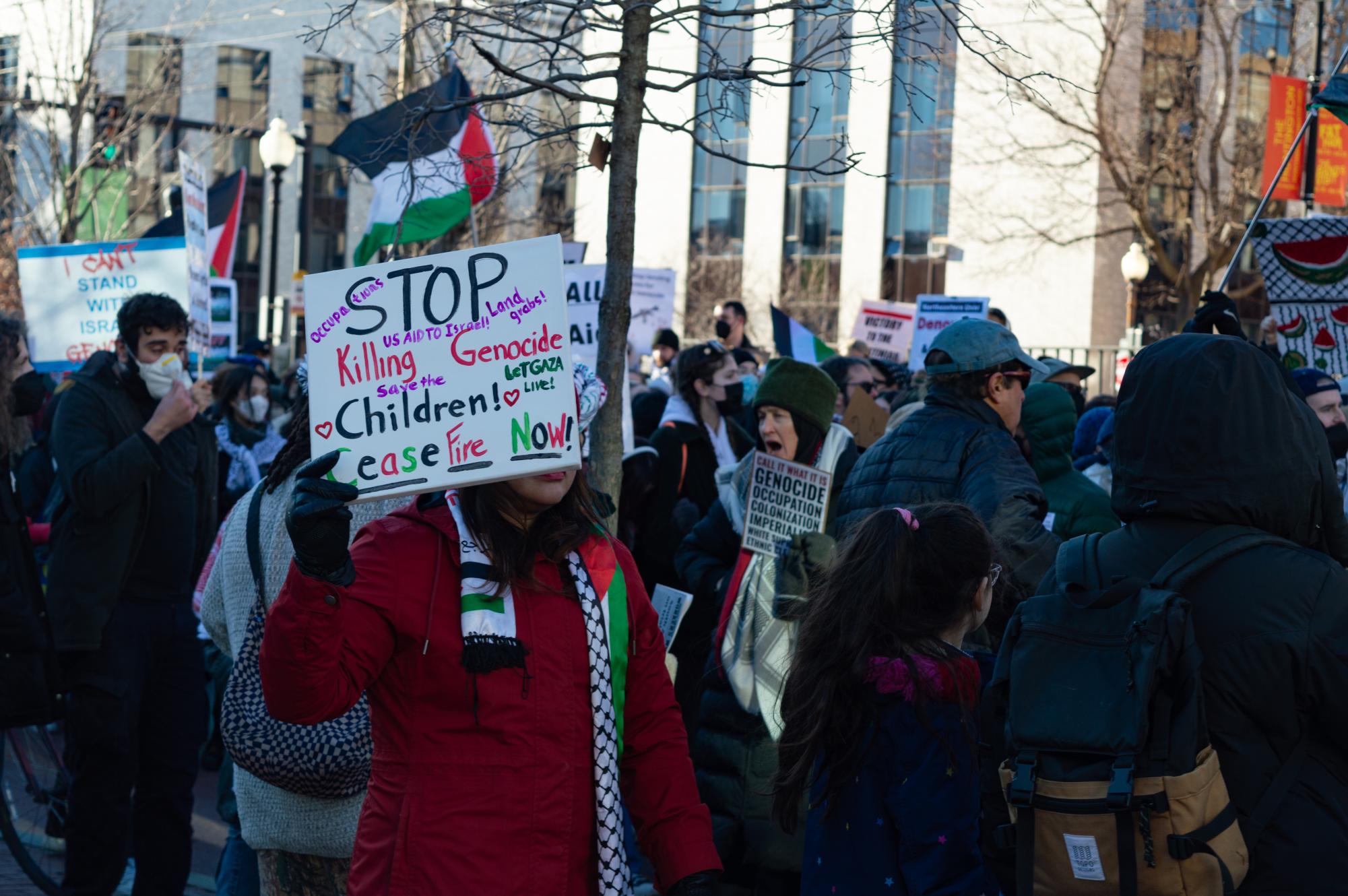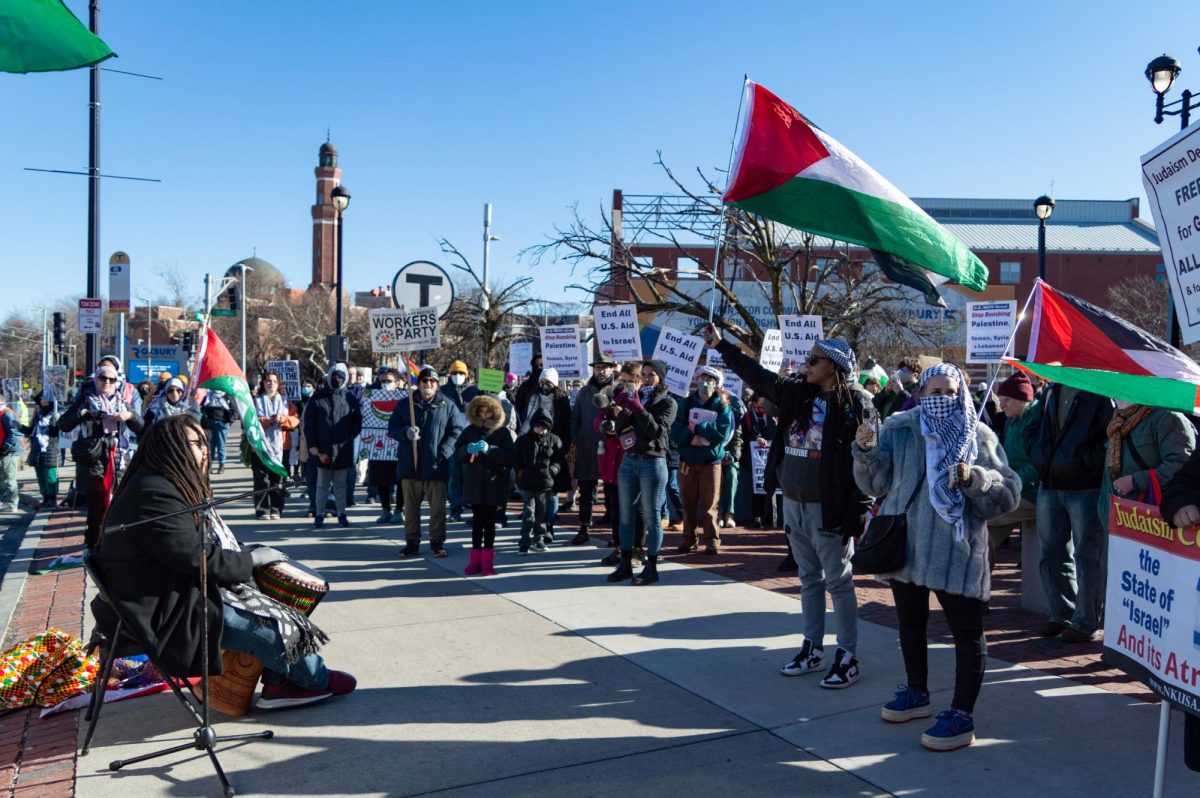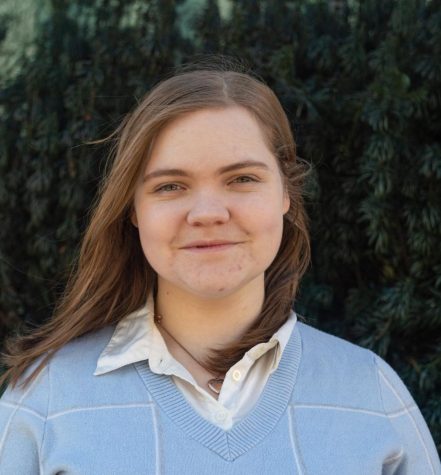Hundreds of demonstrators gathered at Roxbury Crossing Sunday to protest the stifling of pro-Palestine student speech on Boston’s college campuses. The march closed parts of Tremont Street and Huntington Avenue from 2-4 p.m.
The demonstration was organized by the Boston Coalition for Palestine, or BCP, and promoted by Northeastern’s clubs as a “March for Palestine Against Warmakers at Northeastern University.” BCP comprises over 30 organizations across Boston, including Huskies for a Free Palestine, or HFP; Students for Justice in Palestine, or SJP; and Boston’s Party for Socialism and Liberation, or PSL.
The march started at Roxbury Crossing before going down Tremont Street and Huntington Avenue, ending in front of Northeastern’s Krentzman Quad. The group was escorted by two Boston Police Department officers clearing the roads ahead, followed by three SUVs and a police van. Northeastern University Police Department officers stood around the edges of campus with bikes and marked the line between public and private property. Demonstrators overtook the street and sidewalk, shutting down Huntington Avenue between Forsyth Street and Massachusetts Avenue for an hour.

Chants of “Drop the charges,” “Northeastern, you can’t hide, you’re supporting genocide” and “NUPD, KKK, IDF, you’re all the same” echoed throughout the quad.
Speakers at the rally only identified themselves by their first names or the organizations they were with. The News confirmed the identities of several speakers after the protest concluded, but they requested to remain anonymous due to fear of retaliation.
A representative from the Northeastern chapter of SJP spoke about the group’s suppression over the years, including when the university suspended the club for several months in 2014.
The SJP representative, who was granted anonymity due to fear of retaliation by the university, compared some of the actions taken by Northeastern and other universities to the Montgomery lunch counter sit-ins during the Civil Rights Movement.
“You claim that you stand for Black lives, but I call bullshit,” he said. “If you think that we’ll be silent while our brothers and sisters in Gaza are under the rubble, if you think that we’ll be silent while Israel is starving them to death, then you’re delusional.”
This echoed a “clear double standard” toward political speech on campus mentioned during the demonstration by an HFP representative, who said pro-Palestine students face more consequences than pro-Israel students.
“This hypocrisy is impossible to ignore,” the student, who was granted anonymity due to fear of retaliation from Northeastern, said. “They are effectively trying to silence us into submission.”
HFP previously organized a sit-in Dec. 1 that resulted in consequences and disciplinary hearings for three involved students. The students were found responsible during their hearings and were put on deferred suspension.
“Northeastern, we have a message for you,” the HFP representative said. “You can try to silence, to defer, to suspend your students, but you cannot suspend the movement.”
The gathering at Roxbury Crossing opened with a demonstrator playing a drum and singing. The crowd sang along with them to the chorus of “Ella’s Song,” a song honoring Civil Rights activist Ella Baker commonly performed at protests.
Multiple speakers, including students from around Boston, union workers and a rabbi, focused on the importance of solidarity built between groups facing oppression.
This included statements about the long history of Indigenous solidarity between Palestinians and Native Americans, particularly in the Red Power and Land Back movements, and anti-Zionist movements within Jewish populations. Speakers also argued Zionism is a relatively new concept that promotes antisemitism by vilifying all Jews.
Along with the outpouring of support, a Palestinian student from Harvard, Lea Kayali, warned against the popularized “synthetic solidarity” based only on suffering.
“We are here today to turn our grief into action,” Kayali said. “I do not want the omnipresence of Palestinian death to allow your solidarity with us to stop at our corpses.”

Kayali asked attendees to reflect on their involvement with complicit institutions such as their workplaces, schools and communities. “Are you invested in genocide?” she said.
Kayali highlighted the importance of a strategy referred to as BDS, which stands for boycott, divest and sanction, both at the institutional and personal levels. For her and many others at the march, this strategy is frequently used among student populations in Boston universities.
“Student movements across campuses are so important in this fight,” the HFP representative said.
Other demonstrators agreed with this sentiment, saying the punished students at Northeastern are leading the youth movement for Palestine in Boston. Multiple speakers restated throughout the event that they would not be intimidated or deterred by institutional repression of their speech.
“As long as Palestinians are being killed, detained and oppressed, as long as Palestine remains under occupation, we will remain loud,” the HFP representative said. “We will not be silenced. We will not bow down to bureaucratic fear and censorship.”
Another speaker also highlighted the recently passed ceasefire resolutions in Somerville and Cambridge as proof that collective action can influence legislative change.
“Now let the festivities actually begin,” organizers said as music played loudly, including “Dammi Falastini” by Mohammed Afsaasni and “Allah M7yeh Falastin” by Muhannad Khalaf. Demonstrators began to dance and sing along, integrating a celebration of Palestinian culture and livelihood into the event.
“We Palestinians are not a sum total of our suffering. We Palestinians have lives worth living, lives full of the little details that make a man who he is,” Kayali said. “We do not fight for the sake of sacrifice, we sacrifice because we have something to fight for.”
Editor’s Note: This story was originally published Feb. 8 including direct quotes from speakers at the demonstration. After an internal clarification of editorial policy after the story had been published — that direct quotes may only be included if The News can verify the full identities of the source — it was updated March 1 to only include direct quotes of people that could be verified.











